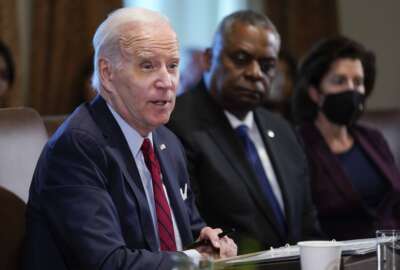Senate bill calls for random background checks for clearance holders
Five senators introduce bipartisan bill aimed at enhancing how the Office of Personnel Management handles the clearances of federal employees and contractors to...
In the aftermath of the Sept. 16 shootings at the Navy Yard and security leaks caused by former National Security Agency contractor Edward Snowden, a group of senators has decided it’s time to update how the government conducts security clearance background checks.
Sens. Susan Collins (R-Maine), Claire McCaskill (D-Mo.), Kelly Ayotte (R-N.H.) and Heidi Heitkamp (D-N.D) introduced the Enhanced Security Clearance Act of 2013, bipartisan legislation aimed at enhancing how the Office of Personnel Management handles the clearances of federal employees and contractors to access classified information.
If enacted, the legislation would require that OPM conduct random, automated reviews twice every five years of public records and databases for information about individuals with security clearances.
The type of information the audits would search for includes criminal or civil legal proceedings; financial information; terrorist or criminal watch lists; and any publicly-available information linking an individual to potential blackmail, compulsive behavior, a change in ideology or an allegiance to another nation. Individuals with security clearances are already required by law to disclose this information.
“Although we have made significant advances in the processing of background checks, there is still a gaping hole in the current security clearance process that has enabled people who exhibit obvious signs of high-risk behavior to remain undetected,” Collins, a member of the Senate Select Committee on Intelligence, said in a release. “There needs to be a balance between the processing of clearances quickly enough to allow individuals to do their jobs, but also thoroughly enough to flag potential problems. Our legislation represents a sensible path forward to protect national security and to help prevent future tragedies.”
Collins is also the former chairwoman and ranking member of the Senate Homeland Security Committee. That committee is conducting a hearing on Thursday looking into the government’s process for issuing security clearances and conducting background checks following the Navy Yard shootings.
Scheduled to testify are Joseph G. Jordan, administrator of the Office of Federal Procurement Policy in the Office of Management and Budget; OPM Acting Director Elaine Kaplan; Brian Prioletti, assistant director of the Special Security Directorate, National Counterintelligence Executive in the Office of the Director of National Intelligence; Stephen Lewis, the deputy director for personnel, industrial and physical security policy, in the Directorate of Security Policy and Oversight, Office of Under Secretary of Defense for Intelligence, Defense Department; and Brenda Farrell, director of defense capabilities and management at the Government Accountability Office.
On Wednesday, the Subcommittee on Oversight and Management Efficiency of the House Homeland Security Committee conducted a hearing that examined the same gaps in the security process.
That hearing coincided with the release of a new GAO report that was critical of the Department of Homeland Security’s Federal Protective Service’s contractor guard program. FPS guards were onsite at the Navy Yard when the shootings occurred but were not the primary responders to the active-shooter situation. The report questioned whether individuals in the FPS contractor guard program receive all the necessary basic instruction, including firearms and screener training, required by their contracts.
TechAmerica, a nationwide technology association, came out in support of the Senate bill.
“This legislation is a critical step forward in updating the security clearance process that must reflect, not only the current environment, but also the many technological advances that are available to those maintaining our Nations’ security,” said Trey Hodgkins, senior vice president for the Global Public Sector at TechAmerica, in a release. He also wrote a letter to the senators voicing his organization’s long-term support for improving the security clearance process.
The following organizations and individuals joined TechAmerica in support of the Collins-McCaskill-Ayotte-Heitkamp bill:
- Federal Managers Association;
- The FBI Agents Association;
- The Alcohol-Tobacco-Firearms and Explosives Association;
- The International Association of Chiefs of Police
- The National Native American Law Enforcement Association;
- General Dynamics Information Technologies;
- Lexis-Nexus;
- Lt. Gen. Charles J. Cunningham Jr.,former director of the Defense Security Service (1999-2002);
- Brian Stafford, former director of the Secret Service (1999-2003);
- Howard Safir, former police commissioner of New York City (1996-2000);
- Floyd Clarke, former director of the Federal Bureau of Investigation (1993);
- Michael Sullivan, former acting director of the ATF (2006-2009) and U.S. Attorney for the District of Massachusetts (2001-2009);
- and the International Federation of Professional and Technical Engineers.
Also on Wednesday, the Justice Department joined a whistleblower False Claims Act suit filed by a former employee of United States Investigation Services, the country’s largest provider of background investigations. The suit alleges USIS failed to properly review its casework before providing it to OPM.
RELATED STORIES:
Federal building security at risk due to lax training, oversight
DOJ joins whistleblower suit against company that vetted Snowden, Alexis
Copyright © 2024 Federal News Network. All rights reserved. This website is not intended for users located within the European Economic Area.
Michael O’Connell is senior digital editor of Federal News Network optimizing content for the best user experience. Follow @moconnellWFED
Follow @moconnellWFED






